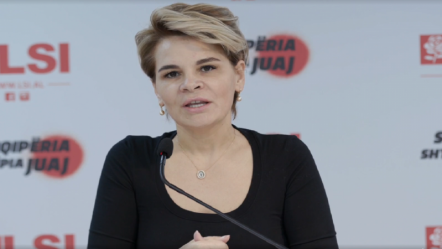 Linda Rama: Between Family, Work and Albania’s Future
Linda Rama: Between Family, Work and Albania’s Future ‘EU Reporter’ warns that Russia is trying to destabilize the Balkans by funding right-wing parties and extreme forces.
In Albania, according to Euro reporter, the Democratic Party was paid $500,000, but for the first time it is declared that even Monika Kryemadhi as the former chairperson of the LSI party has received some payments from Russian companies with ties to the Kremlin.
EU Reporter has also published a facsimile of the payments that Monika Kryemadhi received during 2017, once with the explanation “dividend for shareholders” and then for “marketing services”.
The Eu Reporter article was deleted from the site a few hours after publication.
But the documents published there circulate in all Albanian media and now it is up to SPAK prosecution to investigate their authenticity.
Let’s follow in its entirety the article that opened a detailed debate about Russian funding in Albanian politics:
Russia using all tools to tighten grip on Balkans
In the past few weeks, US officials and NATO representatives have emphasised the need to protect the Western Balkans from Russian interference and malign influence in the wake of Russia’s unprovoked and brutal invasion of Ukraine. A US State Department spokesperson stated: “Russia’s war has clarified how urgent our work is to assist all the countries of the Western Balkans to fully advance democratic reforms and achieve their aspirations of integration into European and Euro-Atlantic institutions.” Russia has increasingly asserted itself in the region, which is of great geostrategic importance to Moscow and provides Russia with an opportunity to undermine the EU and NATO as well as countering perceived expansionism within Europe.
In its struggle for influence in the Western Balkans, Russia has repeated exploited its energy and natural resources as a geopolitical tool whilst simultaneously illicitly bankrolling and backing right-wing political parties and far right groups.
Russia’s malign influence in countries such as Montenegro and Serbia has been well documented and in the case of Serbia, has been described as “ubiquitous”. Serbia has long relied almost entirely on cheap Russian gas while its main oil producer NIS is owned by Russia’s Gazprom and Gazpromneft. In 2022, Serbia signed a new three-year contract with Russia for cheap gas supplies. The Serbian government can be considered Russia’s closest ally in Europe and, for example, refuses to implement sanctions against Russia in response to the latter’s brutal war in Ukraine.
Montenegro, on the other hand, suffered from a Russia-backed attempted coup in 2016. A US Select Committee Report found that Oleg Deripaska, a sanctioned Russian oligarch with close ties to the Kremlin, had invested and expanded his influence in Montenegro at the behest of the Russian government. He acquired a majority stake in critical national infrastructure, Montenegro’s largest exporter, which he leveraged to grow his political power. Ultimately, by 2016 Deripaska was funding and executing an aggressive Russian-directed campaign to overthrow the Montenegrin government and assassinate the PM in a violent coup with the support of the Democratic Front (DF), a Montenegrin opposition party.
Other countries in the Western Balkans like Albania and Northern Macedonia have historically been less susceptible to Russian interference, primarily owing to their lack of reliance on Russian energy and lack of cultural ties. However, over the past decade Russia has continually sought to malignly influence these countries through various methods, including funding opposition parties with pro-Russian sentiments and attempting to pay off and/or recruit members of the security and political apparatus.
Indeed, as revealed by a 2022 declassified US intelligence assessment, Russia spent US$500,000 bankrolling Albania’s centre right opposition political party, the Democratic Party (DP) in the 2017 Albanian elections. Russia has also allegedly backed far right groups which have propagated conspiracy theories that the incumbent PM Edi Rama and his political party the Socialist party (SP) are controlled by George Soros.
Further evidence uncovered (see below) also shows that Monika Kryemadhi, the wife of the former Albanian president who ruled in coalition with the DP Ilir Meta, received a series of payments in 2017 from companies ultimately controlled by Russian oil businessmen with close ties to the Kremlin through a series of opaque offshore companies.
Top Channel









